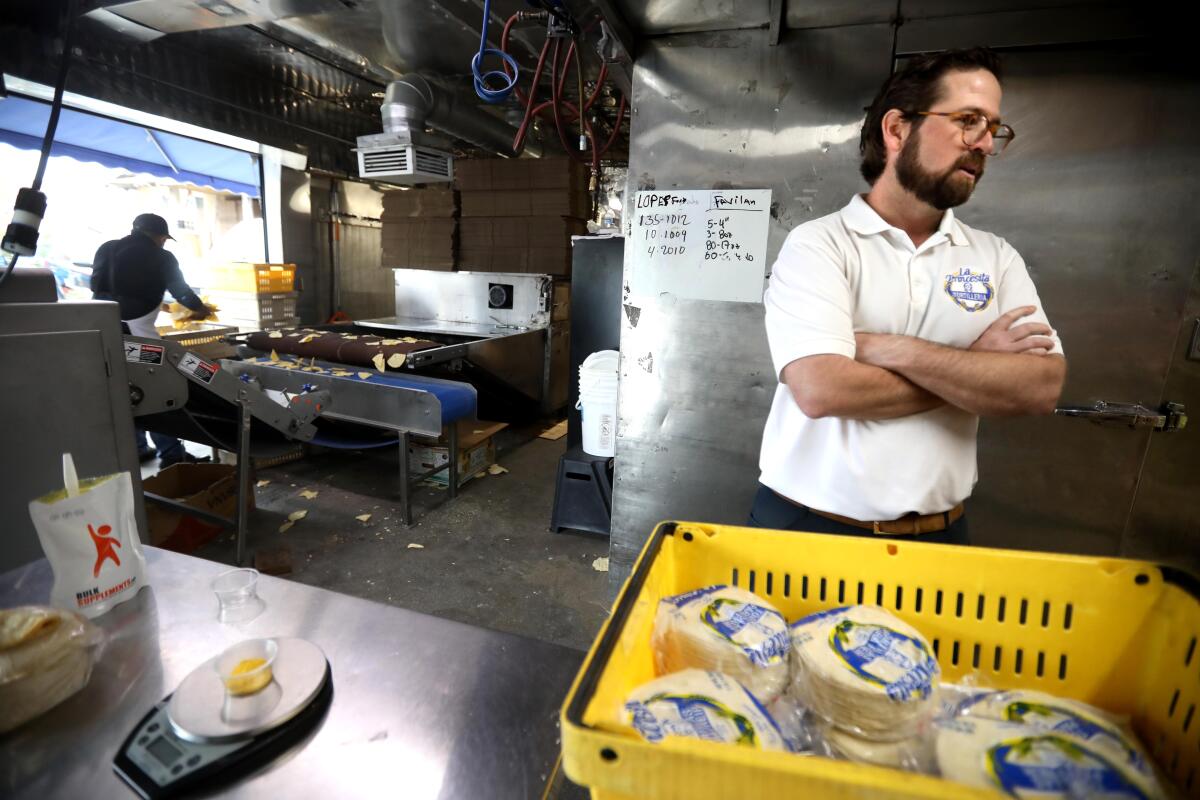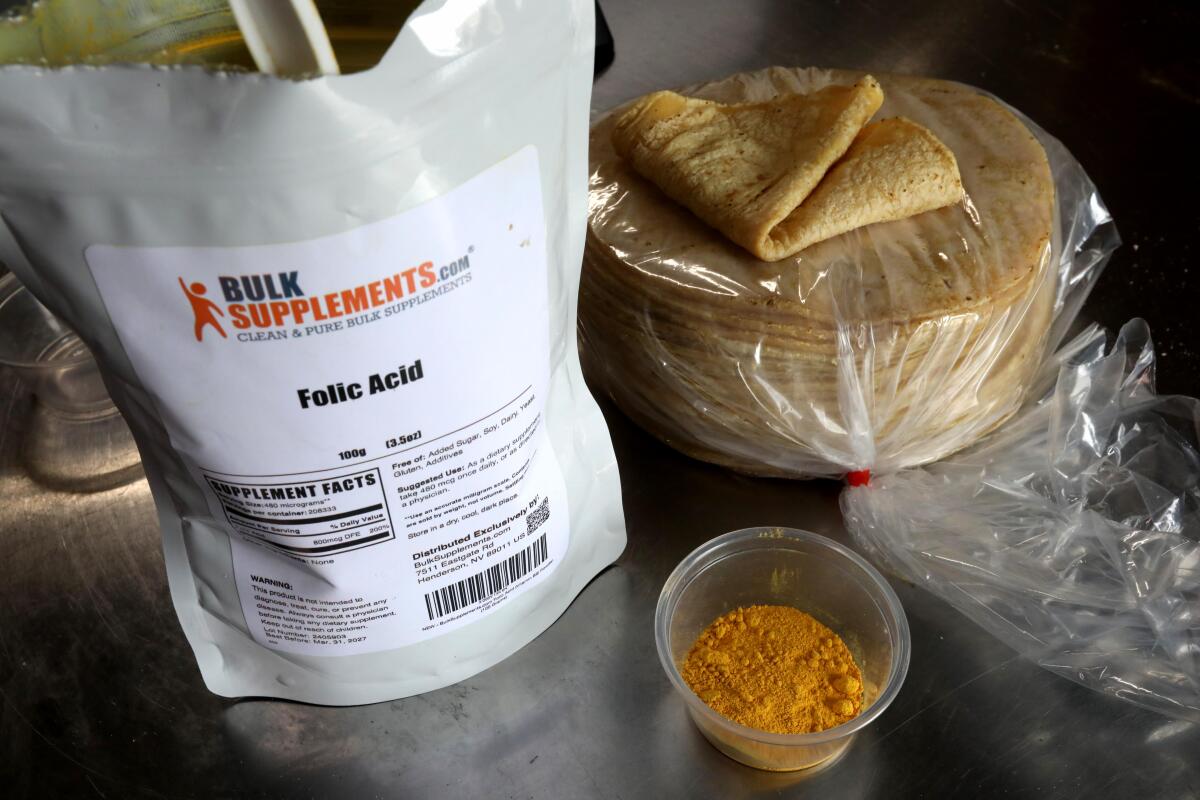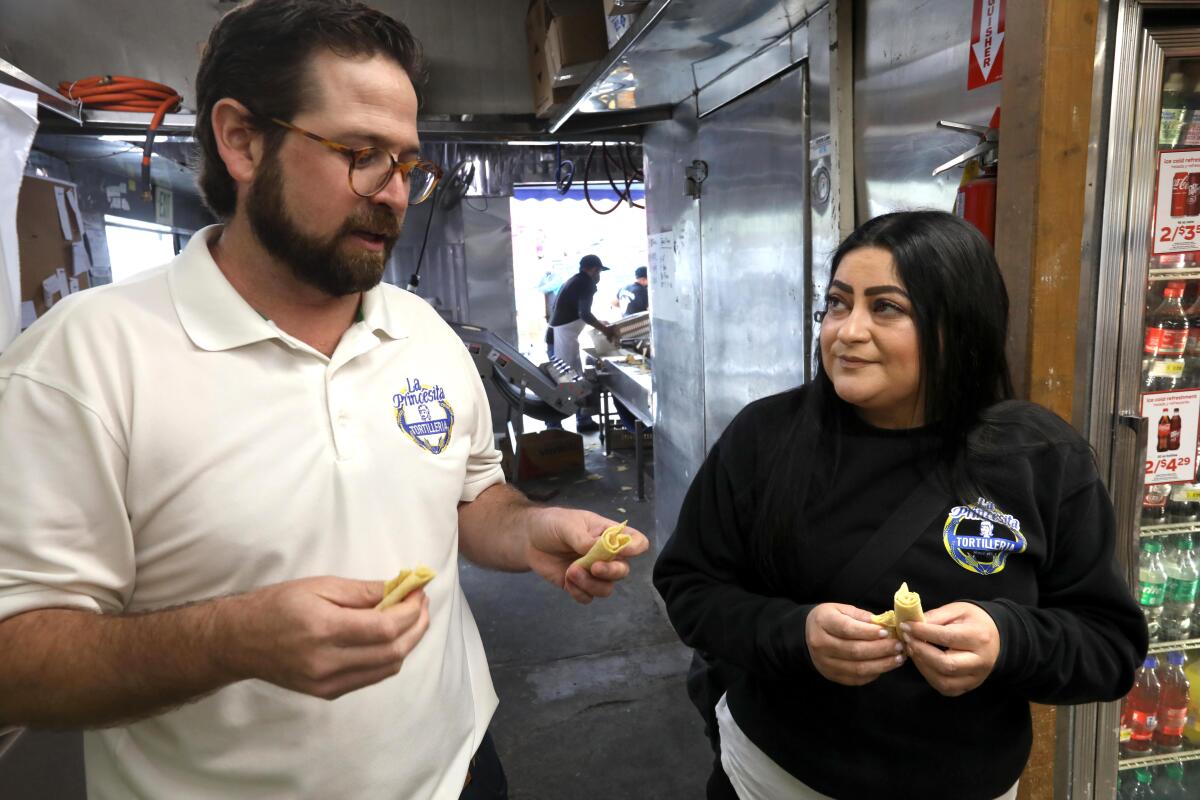Column: California wants to mandate folic acid in tortillas to help babies. Why that’s bad

- Share via
Thursday mornings at La Princesita Tortilleria in East Los Angeles are devoted to making chips, so customers couldn’t get any piping hot tortillas when I visited last week. But CEO Enrique Rodriguez made sure two fresh batches of corn tortillas were available for what we were about to do.
It was time for the Great Tortilla Folic Acid Test.
My older relatives have complained for years that corn tortillas in the United States don’t taste like they should, because most contain as many ingredients as the fine print in an infomercial. That makes them as palatable as the lickable part of an envelope.
But over the last decade, a growing number of restaurants and tortilla makers have gone back to the basics — using just corn, water and lime in a process called nixtamalization — to promote the older, tastier, healthier ways. Some, like La Princesita, never deviated from the practice and became beloved for it.
Nevertheless, health advocates have argued for decades that fortifying masa with folic acid is necessary and have pushed to make it mandatory.
Customers drive all over town for tortillas made from fresh masa.
They cite research showing that consuming it early in pregnancy drastically cuts down on neural tube birth defects such as spina bifida, and that Latina mothers lag far behind in their intake compared with other ethnicities. Folic acid is so important to the health of a fetus that the Food and Drug Administration required its inclusion in 1998 in all enriched grain products, and Mexico did the same to corn masa in 2008. A subsequent study found this reduced the number of children born in the U.S. with neural tube defects by 35%.
Now, a proposed state law would force all commercial California manufacturers of masa and masa products — corn tortillas, pupusas, tamales, tortilla chips, taco shells and more — to include the vitamin starting in 2026. If the proposal, sponsored by Assemblymember Joaquin Arambula (D-Fresno), passes, it would in effect end in California a culinary tradition going back millennia.
A few weeks ago, U.S. Secretary of Health and Human Services Xavier Becerra convened a Zoom meeting on the subject with retail giants such as Kroger and Walmart.
“The consensus in general was it was a good thing, and how do we make it happen?” said Tortilla Industry Assn. Executive Director Jim Kabbani, who attended. “One school of thought is it’s a matter of public education — make it so that people say, ‘I want to buy the product with folic acid.’ Another is, ‘Just put it in there, and let people enjoy the benefits.’”
“The data really spoke to me,” said Arambula, a former emergency room doctor. He was inspired to write the bill — which unanimously passed the Assembly last month and is scheduled for a state Senate health committee hearing next week — after researchers at UC Davis approached him.
Arambula knows what good corn tortillas taste like. Some of his favorite come from El Premio Mayor in Fresno, a taqueria that I completely vouch for. But focusing on masa products, he said, “really spoke to our office to find a culturally appropriate way to ingest folic acid.”
Rodriguez, 40, said he supports Arambula’s “idea and overall intent.” But he’s been in contact with the Assembly member’s office urging an exemption that would allow tortilla makers such as La Princesita — winners of the 2022 edition of my KCRW Great Tortilla Tournament — to sell unadulterated products to restaurants, and for restaurants to pat out their own tortillas.
“Chefs specifically seek out tortillas like ours,” he continued as we stood next to La Princesita’s assembly line. “If the bill goes through, if a chef wants an all-natural tortilla, they’ll just go to makers in Arizona or Texas or other states.”
Rodriguez shook his head. “It’ll change who we are.”

Carlos Salgado, who helped jump-start the modern-day nixtamalization revolution in Southern California with the blue corn tortillas of his now-shuttered Michelin-starred restaurant Taco María, called Arambula’s bill “crudely broad” for including small-batch makers and restaurants. Yet he also sees it as an “incomplete solution,” because it does nothing to lessen prenatal costs or increase health coverage for Latinas. He noted that artisanal bakeries in the state have long used unenriched flours without health inspectors going after them, as Arambula’s bill would do to tortilleros.
“If food legislators can make exceptions for [bakers],” Salgado said, “then they can allow for the continued revival and growth of an ancestral food so important to the health and identity of so many Californians.”
To ask how a tortilla might taste because of a supplement that could save lives sounds petty. But mandating folic acid in masa isn’t like adding fluoride to tap water; it’s messing with cultural patrimony. Asking Latinos to accept a fundamental change to something that’s part of our very essence in the name of a supposedly greater good is little better than culinary imperialism.
Arambula said he did his own taste test and found no difference, arguing that the amount he’s requiring — 0.7 of a milligram per pound of raw masa and 0.4 of a milligram for finished products — amounts to “particles.”
“I think based on the data, we need to make sure we’re protecting our moms and families as best as we can and lean into science to use all the tools that are disposable,” he told me. The Assembly member, who is Latino, didn’t flinch when I pressed on the idea that his bill would basically ban Mexicans, Salvadorans and others in California from enjoying their heritage.
“These disparities won’t resolve themselves, and it’s important for us to fortify. I go back to, I don’t see anything about people complaining about [how bread tasted] prior to 1998. We see the benefits, and we appreciate that.”
His unsympathetic approach is Big Blue California at its worst: thinking that the state should take care of residents from conception to death, and being willing to mess with traditions if they get in the way.
Rodriguez said he asked Arambula’s staffers for the studies they’re relying on for his bill; they declined.
In the competitive world of East Los Angeles tortillerias, where entrepreneurs fight for customers block by block, Francisco Ramírez and his La Princesita towered above them all.
“I’m not questioning the science,” he said. “But is there a way to be part of the solution and maintain the way we’ve always made our tortillas? We want to keep making the tortillas we’ve been making for over 50 years, and our ancestors for thousands of years.”
It was time for my taste test.
Rodriguez took out a 3.5-ounce bag of folic acid powder available on Amazon for $20. “This would last us for a year,” he said as I put some in my palm and tasted it. Chalky, slightly bitter — not disgusting but not pleasant. I washed out my mouth with water, closed my eyes and took two warm corn tortillas.
The first tasted the way a pure corn tortilla should: a pleasant initial tinge of sourness, a soft texture, a concluding rush of earthiness. The second one had a subtle taste of ... something. It lingered longer on the palate than an old school tortilla, and turned too rubbery in my mouth. The difference was obvious — it contained folic acid.
I opened my eyes. The tortilla with folic acid was also slightly more yellow than the one without.
“Everyone [at La Princesita] immediately knew there was a difference and was able to pick our original one,” Rodriguez said. “It doesn’t taste bad, but it’s not the same tortilla.”
La Princesita production manager Cesario “Chayo” Covarrubias, who has worked there for 35 years, passed by in a hairnet and white coat. I asked whether he was able to tell which was which.
“They tasted the same,” he replied in Spanish, drawing a laugh from Liborio Cano, who was shoveling chips into boxes in his first week on the job. “Nah, you could tell them apart easy!”
I asked Chayo how he felt about Arambula’s bill.
“If they want us to put it in, it has to be put in,” he said with a rancho libertarian tone, mixing resignation and matter-of-factness. “If they don’t want us to, we won’t.”
Rodriguez looked at shelves filled with bags of La Princesita’s white corn and yellow corn tortillas. Arambula’s bill would also force manufacturers to indicate on their labels that their products contain folic acid. “We can do a whole line of ones with it,” he said, thinking out loud about a way forward for La Princesita. “Make our packaging pink.” He pointed at La Princesita’s logo, a smiling Jackie O. lookalike. “Hey, we can make her pregnant!”

La Princesita President Monica Ramirez joined us. She took the taste test and also guessed correctly.
“On one hand, I support [the bill] because of health,” said the 44-year-old. “On the other hand, it hurts in my heart because it’s a process that my dad did. It’s what he learned, and it’s what he taught us.”
She offered a pained smile. “It hurts, but both weigh the same to me.”
Rodriguez wants to ask his fellow tortilla makers to write a letter to Arambula and plans to request a meeting with state Sen. Maria Elena Durazo, who represents East Los Angeles. “This is the epicenter of tortilla making,” he said, “so she’s going to have to listen.”
We stepped outside and walked toward an electrical box painted with an image of Francisco “Pancho” Ramirez, La Princesita’s founder, Monica’s father, and Rodriguez’s father-in-law. He’s towering over stalks of corn while dropping kernels onto dark soil. Sunrays envelope the scene as a hummingbird flies next to him.
Rodriguez sighed, resigned to the march of modernity. “That’s how we did it forever.”
More to Read
Sign up for Essential California
The most important California stories and recommendations in your inbox every morning.
You may occasionally receive promotional content from the Los Angeles Times.











